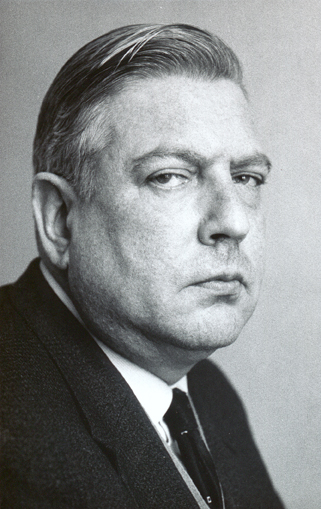
Pylkkänen, Tauno
Tauno Pylkkänen (22.3.1918 – 13.3.1980) studied composition at the Helsinki Conservatory under Leevi Madetoja and Selim Palmgren. He acted also as the Artistic Director of the Finnish National Opera in the 1960s, as a music critic and teacher at the Sibelius Academy.
Pylkkänen is known especially for his stage music, and he was called “Puccini of the North”. According to his own words opera was his true fate. His National Romantic style flourished in the dramatic operas where his musical instinct was said to be at its best. The breakthrough work was Mare ja hänen poikansa (Mare and His Son, 1943) premiered in 1945 in Helsinki – an intense, powerful opera based on the novel by Aino Kallas, a renowned Finnish author who combined folklore and mysticism in her novels. Pylkkänen was especially drawn to her texts which provided inspiration and material to his operas such as the internationally successful Sudenmorsian (Wolf Bride, 1950) which received the third prize at the Prix Italia festival in 1950, and Bathseba Saaremaalla (Bathsheba of Saarenmaa) – a work written when Pylkkänen was only 22 years old.
Tauno Pylkkänen composed altogether ten operas. The first one was Jaakko Ilkka (1937). Simo Hurtta written in 1948 received even more acclaim than the breakthrough work Mare and His Son. Tuntematon sotilas (The Unknown Soldier) premiered in 1967 was also a success with 30 performances. However, it was his last opera and a swan song to his composing career which ended too early in tragic vein.
Pylkkänen composed also orchestral works, e.g. symphonic poems, a ballet (Kaarina Maununtytär) as well as chamber music, a cantata (Räikkö Räähkä, 1941), film music and vocal pieces such as the popular Der Schwan des Todes (Kuoleman joutsen) Op. 21 for voice and piano.
Andante funebere (In memoriam)
(1940)
for orchestra
2221-2000-10-str
Duration: 7
Batsheba Saarenmaalla
1-näytöksinen ooppera (1940)
Opera in one act
3(III=picc)3(III=c.ing)3(III=cl.b)2-4331-11-1-str Baryt, sopr, mezzo, chm
Duration: 40
En tiedä muistatko mua / Jag vet ej, om du mig min
I Wonder If You Remember Me (1948)
for medium voice and orchestra
2121-0000-hp-str
Duration: 3
Huuhkaja huusi yöllä
Aalon aaria radioballadista Sudenmorsian (1950)
for soprano and orchestra
33(III=ca)3(III=bcl)2-4331-10-str
Duration: 3
Intermezzo
(1940)
for small orchestra
1121-2210-12-str
Duration: 4
Kaivotiellä / On the Way to the Well
(1941)
for high voice and orchestra
2221-2210-10-hp-str
Duration: 5
Kuoleman joutsen / Der Schwan des Todes
The Swan of Death (1943)
for medium voice and orchestra
2(II+picc)23(III=bcl)2-3210-11-hp-str Percussione: Tamtam, Triangolo 1. Kuoleman joutsen / Der Schwan des Todes / The Swan of Death 2'30 2. Pastoraali / Pastorale 4'00 3. Viimeinen kehtolaulu / Letztes Wiegenlied / The Last Lullaby 1'30 4. Taivainen rekiretki / Himmlische Schlittenfahrt / The Celestial Sleighride 1'30 5. Joutsenlaulu / Schwanengesang / Swan Song 2'30
Duration: 13
Kuvia Lapista
Sarja pienelle orkesterille
for orchestra
2(II+picc)2(II+c.ing)21-3220-11-hp-str
Duration: 9
Kuvia Lapista [wind orchestra]
(1966)
for wind orchestra
2232 3 433 20012 2, db [fl+pic, asax, tsax, barsax, 4cor in Eb, 2tba in C.]
Duration: 8
Lintu / The Bird
(1941)
for medium voice and orchestra
2221-2000-hp-str
Duration: 3
Mare ja hänen poikansa
Opera (1943)
sopr, ten, 2 baryt, actors, female choir, male choir 3(III+picc).3(III=c.ing).3(III=bcl).2-4.3.3.1-1.3-hp-pf-str
Duration: 125
Maren aaria oopperasta Mare ja hänen poikansa
Mare's Aria from the opera Mare And Her Son (1943)
for soprano and orchestra
2232-4331-11-str
Duration: 3
Preludio sinfonico
for orchestra
3.3(III=c.ing).3(III=cl.b).2-4.3.3.1-1.1-str
Duration: 7
Rannalla / On the Shore
(1944)
for soprano and orchestra
2221-2000-10-cel-str
Duration: 4
Sankarimarssi
(1941)
for orchestra
2222-2210-11-str
Duration: 5
Sudenmorsian
Radioballadi (1950)
Radio opera for soloists, speaker, chorus and orchestra
33(III=ca)3(III=bcl)2-4331-11-str Soli: S-Ms-A-T-reciter-chx
Duration: 45
Venhelaulu / Barcarolle / Barcarole
(1948)
for low voice and orchestra
2230-2000-hp-str
Duration: 3

